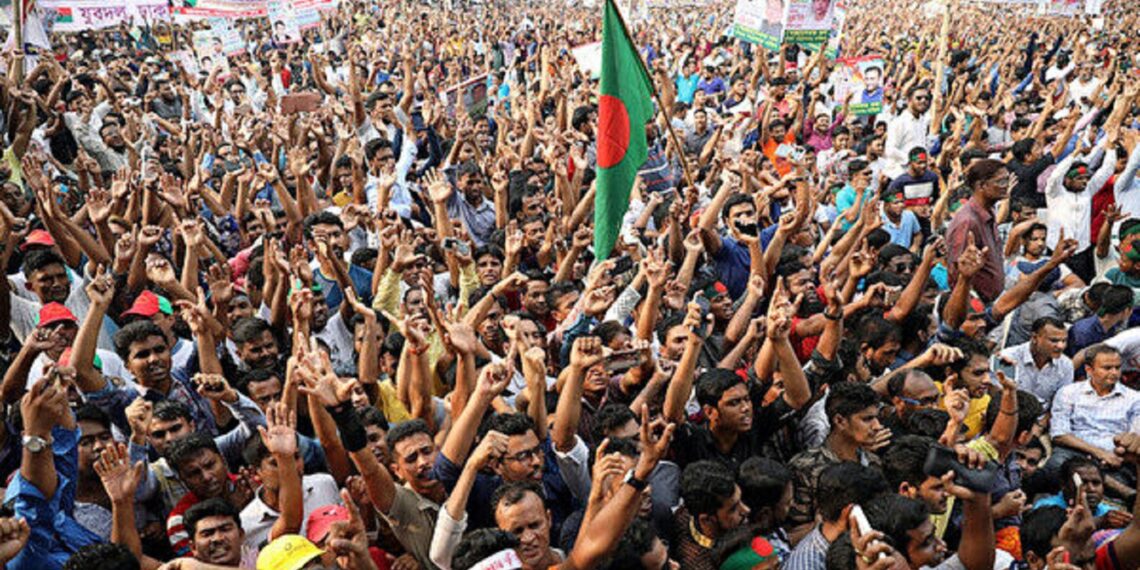Over the last two weeks, 77-year-old Badiul Alam Majumdar has been following a punishing 15-hour daily schedule. He wakes up at the crack of dawn, has a hurried breakfast and hits the roads, very often dirt tracks that run through Bangladesh’s verdant landscape, along with his colleagues.
Majumdar and his colleagues from Shujan, a civil society organisation that has been campaigning for years on good governance, administrative transparency and the urgent need for institutionalised free and fair elections in a country that has had its fair share of military dictatorships and, since 1991, a fragile and rickety parliamentary system, have been holding meetings with divisional and district level bureaucrats, villagers and representatives of different political parties.
As the voters of this country of 170 million people wait with bated breath to cast their franchise in the general elections that are due to be held in January 2024, Shujan’s objective is to remind all stakeholders the imperative of holding free, fair, participatory and competitive elections. This has become all the more urgent because the processes involved in and the outcome of the last two elections – in 2014 and 2018 – were widely believed to have been rigged in favour of the Awami League led by Prime Minister Sheikh Hasina.
Majumdar and his team at Shujan have so far toured seven of Bangladesh’s eight administrative divisions – Dhaka, Chittagong, Mymensing, Rajshahi, Rangpur, Sylhet, Barisal and Khulna – and the outcomes of the meetings at these locations “have been encouraging as the voting population really wants an electoral level playing field,” Majumdar says.
The Shujan team headed for Khulna today after holding meetings with democracy stakeholders in Barisal. Once all the eight divisions are covered, Shujan aims to draw up a “national charter that will codify a comprehensive set of electoral reforms for sustainable democratic process” that the organisation expects all the political parties, and certainly the Awami League and the Bangladesh Nationalist Party (BNP) to follow in its letter and spirit.
In a political system that is defined more by the lack of institutionalised rules and procedures that have often been thrown to the winds by both the Awami League and the BNP, a national charter on electoral reforms sounds like anathema. By all accounts, the weak foundations of Bangladesh’s political system and fledgling democracy are at once outcomes of imperfect processes, rules and regulations as they are of systematic manipulation of the levers of governance, subversion of the bureaucracy and endemic systemic graft. Most political observers agree that “these conditions” created the grounds for both covert and overt intervention of foreign powers in Bangladesh’s politics and, at times, their “unfortunate” outcomes.
“Shujan has been trying and will continue to strive towards comprehensive electoral reforms. At the heart of our objective lies reforms in the political parties, constitutional amendment and an effective parliament,” says Majumdar, who is also country director of The Hunger Project.
Eight years ago, into the first year of Bangladesh’s tenth parliament, which returned as many as 153 Awami League legislators “unopposed” to the Jatiya Sangshad, the International Crisis Group (ICG) observed, that “even inclusive parliaments were hampered by confrontational, zero-sum politics, marked by parliamentary resolutions against the opposition party and frequent opposition boycotts. Passage of the fifteenth amendment was emblematic of the unwillingness to cooperate; the ruling party pushed it through without meaningful consultation. Likewise, the BNP opted to boycott polls, resorting instead to violent agitation and so undermining the legislature’s ability to check executive overreach”.
Noting that “Article 55 of the constitution vests all executive authority in the prime minister rather than cabinet”, the ICG observed that this is led to centralisation of authority in the prime minister’s office. Consequently, the line between centralisation of power and the abuse of authority has been blurred with terrifying results for the people.
“The poor and hapless people of Bangladesh want to reclaim their voting rights and an end to political violence that has been a feature of the country’s political system and culture. It is undeniable that even as civil society is in a bad shape in Bangladesh, where patronage politics and the spoils system is predominant, we have an obligation to at least try and take remedial measures to revive democratic institutions,” Majumdar says.
Majumdar knows that the road to true democratic and parliamentary principles is paved with far too many obstacles. A Shujan note, that outlines the organisation’s 17-point aim to establish long-term solutions, says that the “current political conditions are not conducive to hold competitive and acceptable elections”, a position which is not very different from the one taken by the European Union which recently declared that it would not send election observers to Bangladesh since the prevailing realistic conditions in Bangladesh were not favourable or propitious for holding elections.
The incumbent Awami League government, marred by allegations of widespread corruption, proven or otherwise, massive repression and rampant misuse of the law enforcement machinery and other human rights violations, has shown no inclination to hold the elections under the aegis of a caretaker or interim government.
An adverse outcome at the hustings could spell the doom for the “oligarchs” and powerful sections of the Awami League and their family members alleged to have filled their coffers with public money. There is real fear in the higher echelons of the ruling Awami League about the US punitive visa restriction action. There is apprehension that stronger measures might be imposed to force the Awami League to capitulate and allow for free, fair and truly participatory elections. This is the first time that much of Bangladesh is pinning hopes on a foreign power to stop an anti-people government in its tracks. “Inshallah,” Majumdar proclaims.















